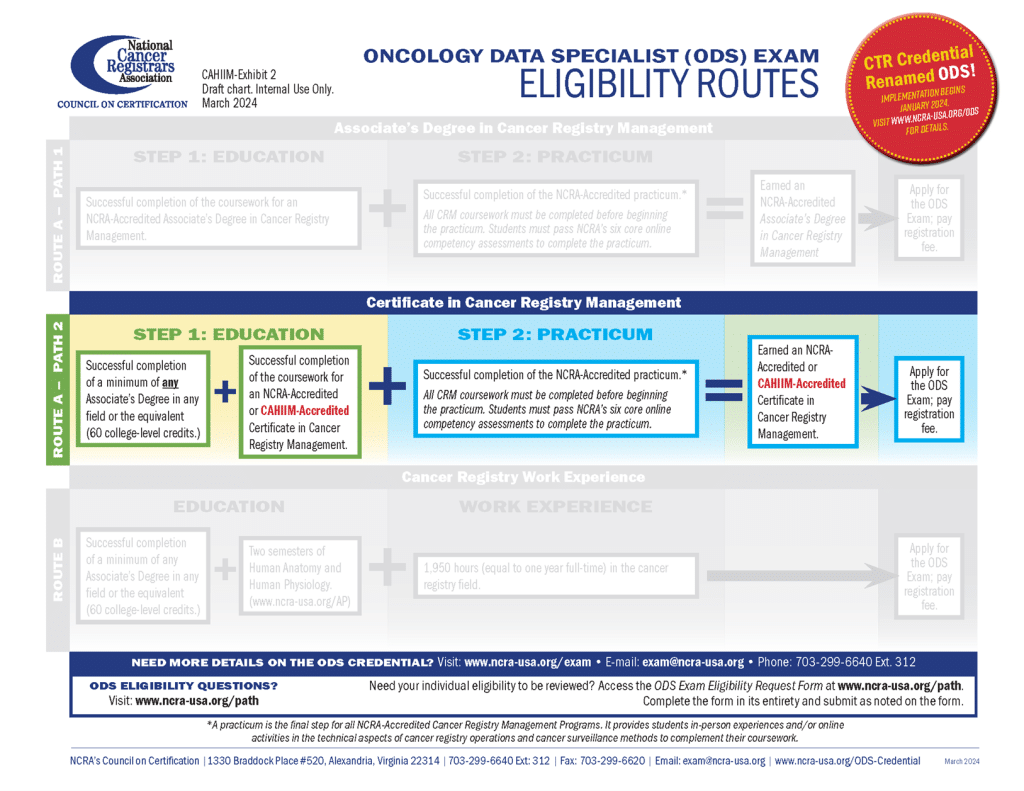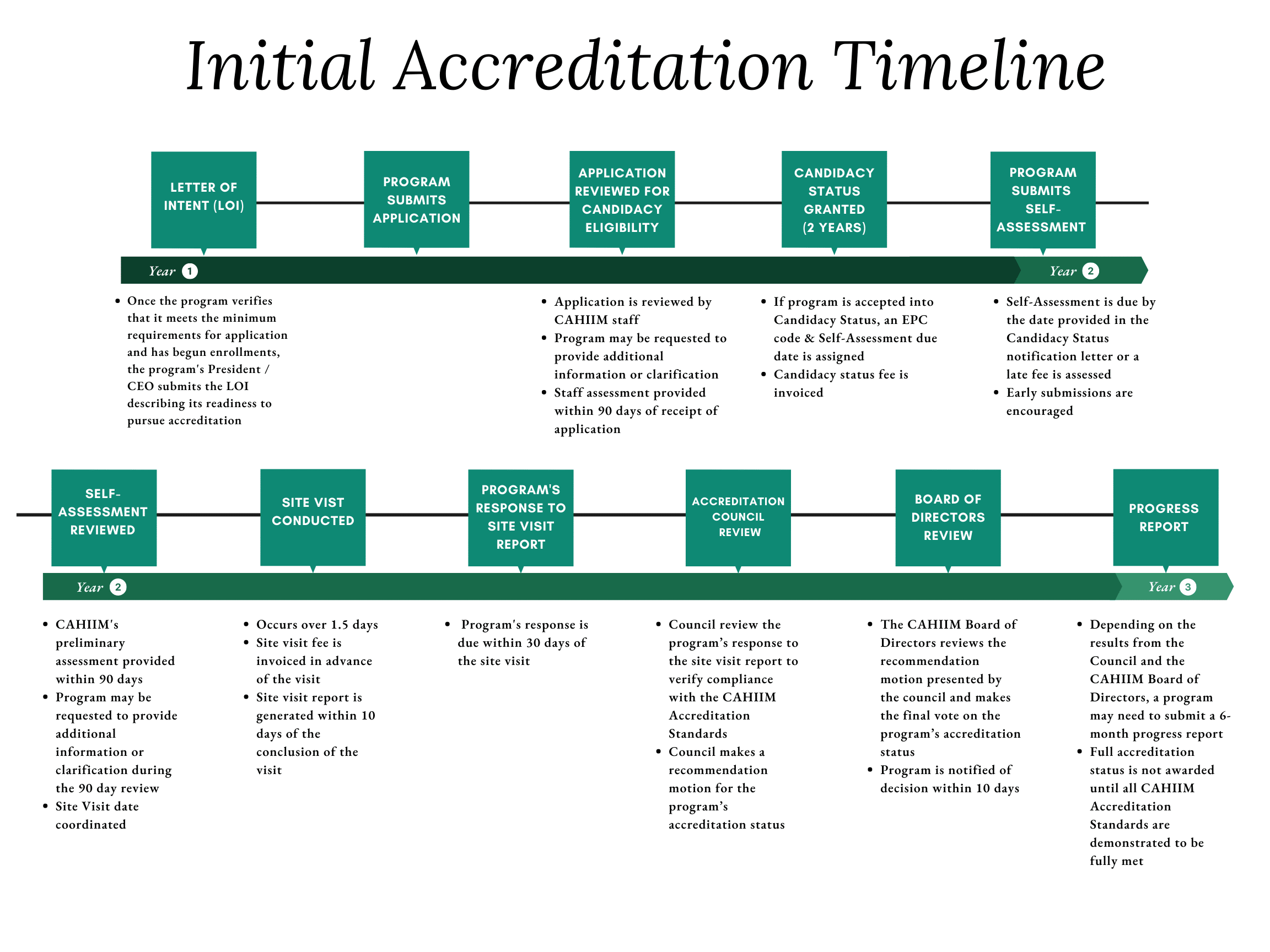Cancer Registry
Cancer registry involves studying how to collect, manage, and analyze data on cancer cases. This includes tracking patient demographics, diagnoses, treatments, and outcomes to identify trends and improve healthcare. Students in this field learn about data management, public health, epidemiology, and cancer research. Cancer registry professionals support cancer prevention, clinical trials, and healthcare policy, playing a key role in improving cancer care and guiding healthcare decisions.
Cancer Registry Accreditation
ODS Eligibility Routes
ODS Eligibility Routes
Students graduating from a CAHIIM-accredited Cancer Registry Management certificate program may qualify for the Oncology Data Specialist (ODS) credential via Route A – Path 2.
Step 1: Education
Students are required to hold, at minimum, an Associate’s Degree in any field or equivalent (60 college-level credits) and to have completed the CAHIIM-accredited certificate program in Cancer Registry Management.
Step 2: Practicum
Upon completion of their coursework, students are eligible to participate in the NCRA-Accredited practicum. Successful completion of the practicum requires passing all core competency assessments.
Step 3: ODS exam
Successful completion of steps 1 and 2 renders students eligible for the ODS credential application. Upon achieving a passing score on the examination, they will be awarded the ODS credential.

Initial Accreditation
Initial Accreditation
Introduction
Prior to the application process, a sponsoring institution must develop a program that meets the professional curriculum content and quality of the program as measured by the Cancer Registry Accreditation Standards and Program administrators must ensure that the program is sustainable per its resource and needs assessment. The program must be developed to ensure stability professionally and financially.
Candidacy Status Application Process
Conditions for Pre-Application
Note: Programs applying for initial accreditation do not have to wait until they have a graduating class to apply.
Timing: Program assesses readiness for application for accreditation.
The following requirements must be met or completed during this stage in development and when submitting an application:
Program Director: Have hired a permanent Program Director that meets the minimum qualifications in the Standards for a Program Director. The position must be full time throughout the application process.
Applicant Program Campus: The program and campus applying for accreditation must award the degree which includes online applicant campuses.
Other campus institutional requirements: The sponsoring institution is accredited by a regional or national accrediting institutional organization recognized by the U.S. Department of Education (USDE) to offer a degree or the sponsoring institution accredited by a national accreditor with USDE provisions their Grant for Accreditation for establishing eligibility to participate in Title IV programs. Upon request, the applying campus program must provide the OPEID number assigned by the U.S. Department of Education as proof of participation for financial aid. State Board of Education approvals must also be completed.
Curriculum Requirements
Cancer Registry Curriculum
Programs will be evaluated against the NCRA curriculum requirements.
Standards
Cancer Registry Accreditation Standards
Cancer registry involves studying how to collect, manage, and analyze data on cancer cases. This includes tracking patient demographics, diagnoses, treatments, and outcomes to identify trends and improve healthcare. Students in this field learn about data management, public health, epidemiology, and cancer research. Cancer registry professionals support cancer prevention, clinical trials, and healthcare policy, playing a key role in improving cancer care and guiding healthcare decisions.
Website Requirements
Website Publication Requirements
Public Disclosure Policy (see CAHIIM Accreditation Manual)
CAHIIM Accreditation Standards require that all accredited programs make available to the public
- Their location and accreditation status.
- Admissions policies and procedures.
- Policies on advanced placement, transfer of credits, and credits for experiential learning.
- Number of credits required for completion of the program.
- Tuition/fees and other costs required to complete the program.
- Policies and procedures for withdrawal and for refunds of tuition/fees.
- Academic calendar.
- Student grievance procedure.
- Criteria for successful completion of each segment of the curriculum and graduation.
The program and its sponsoring educational institution must accurately represent this information and ensure that the information is published and accessible to all applicants and enrolled students.
Programs accredited by CAHIIM must also use the prescribed CAHIIM Accreditation Statement in all materials and online resources that refer to the program’s accreditation status:
The (HEALTH INFORMATION MANAGEMENT/HEALTH INFORMATICS) accreditor of [COLLEGE NAME] is the Commission on Accreditation for Health Informatics and Information Management Education (CAHIIM). The College’s accreditation for [ASSOCIATE/BACCALAUREATE/MASTER] degree in (HEALTH INFORMATION MANAGEMENT/HEALTH INFORMATICS) has been reaffirmed through [YEAR OF NEXT ACCREDITATON CYCLE]. All inquiries about the program’s accreditation status should be directed by mail to CAHIIM, 200 East Randolph Street, Suite 5100, Chicago, IL, 60601; by phone at (312) 235-3255; or by email at info@cahiim.org. The Accreditation Statement must also include the CAHIIM Seal graphic in the form provided by CAHIIM.
The CAHIIM Seal is registered in the U.S. Patent and Trademark Office. The Seal is for accredited program use only and is to be used for announcements and published statements of accredited status. Use by programs in Candidacy status or non-accredited status is prohibited. It must be used in its entirety and not modified other than in size. Use of any other CAHIIM logo is prohibited. Use of the seal must be in conjunction with the required Accreditation Statement for Maintaining Accreditation. Accredited programs must document the specific recognized campus in all published media. The Seal is available for all accredited programs in the “Resources” tab of the Annual Program Assessment Report (APAR) system. The login permission for the program director in the system allows the Program Directors to access the information. For CAHIIM-accredited programs, the Seal is available in the following formats: png, tif, eps, jpg.
Program and Student Outcome Data
On an annual basis, the program must post the previous year’s program graduation and employment rate, as well as at least one (1) of the following:
i. retention rate
ii. academic transfer
iii. graduate school entry
iv. 4-year undergraduate program entry/ Academic progression rate
v. student satisfaction rate
vi. certification exam pass rate (if applicable)
Outcome data must be as recent as the academic year reported in the most recent Annual Performance and Accountability Report (APAR). The data must specify the year it represents and be posted within one click of the program’s landing page.
Noncompliance
Yearly, CAHIIM conducts a review of all active accredited programs to confirm compliance with the Public Disclosure policy. If the program is noncompliant with the policy, it is granted 14 days to come into compliance without incurring an administrative fee. If the program remains noncompliant after 14 days, an administrative fee will be charged in accordance with the fee schedule.
If, after 65 days, the program’s website remains noncompliant or incomplete, the program is referred to the programmatic Council for deliberation, who may recommend a written report demonstrating corrective actions, or place the program on show cause for pending accreditation actions.
Definitions
CAHIIM does not require programs to use the following definitions, as these will not be applicable to all programs. If a program’s institution defines a particular rate in a different way, the program may use their institutional definition. The following definitions serve as examples.
Graduation rate – the percentage of a school’s first-time, first-year undergraduate students who complete their program within 150% of the published time for the program. For example, for a four-year degree program, entering students who complete within six years are counted as graduates (Definition from FAFSA). This cannot simply be a total number of graduates; it must be a rate.
Employment rate – the percentage of graduates from a program who are employed within a specified time frame. Program must specify the time frame (Ex. Within 6 months of graduation). Generally, graduates pursuing further education are not included in the total. For example: A program with 4 graduates, where 2 gained employment and 2 entered a graduate program would report a 100% (2/2) employment rate. Programs may choose to differentiate employment rate within a related field (healthcare) from the overall employment rate.
Retention rate – the percentage of a school’s first-time, first-year undergraduate students who continue at that school the next year. For example, a student who studies full-time in the fall semester and keeps on studying in the program in the next fall semester is counted in this rate (Definition from FAFSA).
Academic transfer – the percentage of a school’s first-time, first-year undergraduate students who transfer to another college within 150% of the published time for the program. For example, a student who is in a four-year degree program is counted as a transfer if the student goes to another college within six years (Definition from FAFSA).
Graduate school entry rate/4-yr undergraduate program entry – the percentage of a school’s graduates who enter a graduate program upon completion of the program.
4-year undergraduate program entry rate/Academic progression rate – the percentage of a school’s graduates who progress to a 4-year undergraduate program upon completion.
Student satisfaction rate – the percentage of students who have acknowledged satisfaction with their educational experience in the program, based on a student satisfaction survey.
Certification exam pass rate – the percentage of students who tested and passed the applicable certification exam for the program. For example, the pass rate for RHIT (Associate HIM programs) or RHIA (Baccalaureate HIM programs). NOTE: There is currently no applicable certification exam for Health Informatics programs.
Development & Consultation Service
CAHIIM offers assistance and advising service for programs who are in various stages of development and implementation. Paid services are available in developing accreditation and compliance activities toward program improvement.

